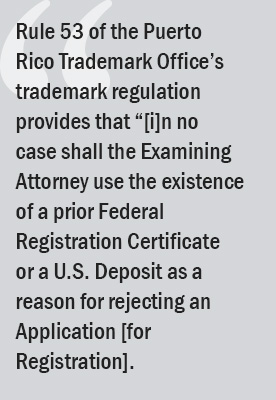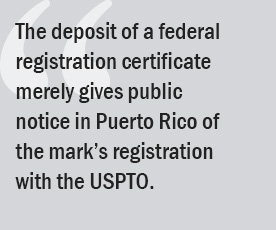The Obligation to Record a Trademark Licensee as an ‘Authorized User’
Published: February 1, 2019
Bernardo Herrerias Hogan Lovells Mexico City, Mexico
Trademark licensing is an important and common tool for obtaining a return on investments made in the recognition and reputation of a trademark in the market, as well as to control and ensure that, when expanding a business, consumers’ expectations and the quality standards connected with the brand will be met.
 But what are the key points to consider when entering into a trademark license in Mexico? One crucial step is the registration of the license with the Mexican Institute for Industrial Property (IMPI). While not the only aspect to consider, it is without doubt one of paramount importance, given its serious implications for the validity and strength of a mark.
But what are the key points to consider when entering into a trademark license in Mexico? One crucial step is the registration of the license with the Mexican Institute for Industrial Property (IMPI). While not the only aspect to consider, it is without doubt one of paramount importance, given its serious implications for the validity and strength of a mark.
This article focuses on the obligation to record a licensee as an “authorized user” and the implications of the failure to do so under Mexican law. Part I of this article examined the obligation under Israeli law and was published here.
Is It Mandatory to Register a Trademark License in Mexico?
The strict answer to this question is no. Trademark owners in Mexico are not obliged to record any trademark licenses they issue before IMPI or any other authority in Mexico. Unregistered licenses are therefore valid and binding between the parties even without registration.
However, not registering a trademark license with IMPI can have severe negative consequences for the trademark owner, ranging from not being able to rely on the licensed use when proving a trademark’s reputation, to losing the trademark as a result of a non-use cancellation action.
The legal framework for trademark licenses, as well as that of franchise agreements, which are considered as two separate concepts under Mexican law, is established by Articles 136 to 150 of the Mexican Industrial Property Law (IPL). Article 136 stipulates that “trademark licenses shall be registered with the Mexican Trademark Institute in order to be binding vis-à-vis third parties.” (emphasis added) Article 141 further states that “use of the mark by the user holding a license registered with the Institute shall be considered made by the owner of the mark.” (emphasis added)
In short, Mexican law states that if a trademark license is not recorded with IMPI, it is not enforceable against third parties. This means that use by the holder of an unrecorded license will not be attributed to the trademark owner licensor; therefore, it is important to record trademark licenses in Mexico even though such registration is not mandatory.
 The above provisions of the IPL cover licenses for both registered trademarks and pending applications. The IPL does not provide for recording of a license with IMPI with respect to unregistered trademarks. This is in line with the overall approach of the Mexican Trademark Law, which provides only a limited scope of protection for unregistered trademarks. One of the very few enforceable rights of unregistered trademarks is that their prior use could invalidate a registration that has been filed after the use of the unregistered mark commenced. If such prior use of an unregistered mark was made by a party other than the registrant itself, then it would need to be demonstrated by evidence other than a registered license, such as corporate control over the using party (see further comments below).
The above provisions of the IPL cover licenses for both registered trademarks and pending applications. The IPL does not provide for recording of a license with IMPI with respect to unregistered trademarks. This is in line with the overall approach of the Mexican Trademark Law, which provides only a limited scope of protection for unregistered trademarks. One of the very few enforceable rights of unregistered trademarks is that their prior use could invalidate a registration that has been filed after the use of the unregistered mark commenced. If such prior use of an unregistered mark was made by a party other than the registrant itself, then it would need to be demonstrated by evidence other than a registered license, such as corporate control over the using party (see further comments below).
When in Doubt, Record Your License
As discussed above, if a trademark license is not recorded under Mexican law, the trademark owner may not rely on any use of the mark made by the licensee. This can have significant implications for the validity and strength of the trademark registration in Mexico.
Trademark owners are required by law to use their trademark for the goods and services for which it is registered within three years of the date of registration. Art. 130 IPL. If the owner has not used the trademark for a continuous period of three years after registration, the trademark is considered vulnerable to lapsing for non-use and may be attacked by third parties via a non-use cancellation action. Art. 130, 152 II IPL.
If the trademark has been used solely by a party other than the registered trademark owner, evidence of that use may be submitted to show use of the trademark in defense to a non-use cancellation action only if the parties’ agreement (trademark license or franchise agreement) has been recorded with IMPI. See, e.g., First Section of the Superior Court of the Federal Court of Fiscal and Administrative Justice, Judgment No. 5704 / 03-17-10-6 / 1038/03-S1-02-03, Jan. 13, 2004 (stating that “if the plaintiff granted an exclusive distribution license for its brand to a third party, but said license was not registered with the Mexican Institute of Industrial Property, it is considered that the invoices issued by said distributor do not prove the use of the mark as required under article 130 of the Industrial Property Law.”).
In limited situations, use by a licensee under a license that has not been recorded will be considered. See Art. 1708.9 NAFTA and Art. 19(2) TRIPS. The general rule, however, is that trademark owners will not be able to benefit from any use of their marks by third parties unless and until the agreement under which the use is permitted is registered with IMPI. As a consequence, if the trademark owner does not have sufficient evidence to prove that the mark is used either by the owner or by a registered user (licensee), the registration could be canceled if a third party files a non-use cancellation action.
Another key reason why it is important to record trademark licenses or franchise agreements relates to the strength of a trademark in Mexico, and specifically its reputation and increased level of distinctiveness. A trademark can benefit from the broader scope of protection of a well-known trademark in Mexico if the majority of the public or a given sector is aware of the mark as a result of its extensive use in Mexico and abroad. For the purpose of providing evidence for such extensive use, trademark owners can generally only rely on their own use or any use carried out by a registered licensee recorded with IMPI. If the licensee does not appear as the authorized user for the trademark in question, IMPI is allowed to reject the respective evidence and consequently deny the request that the trademark can be considered well-known in Mexico.
Possible Exception Under TRIPS and NAFTA-“Control over Trademark Use”
Article 19, Section 2, of the Agreement on Trade-Related Aspects of Intellectual Property Rights (TRIPS) states that “subject to the control of its owner, use of a trademark by another person shall be recognized as use of the trademark for the purpose of maintaining the registration.” Similarity, Article 1708.9 of the North America Free Trade Agreement (NAFTA) states that “[E]ach Party shall recognize use of a trademark by a person other than the trademark owner, where such use is subject to the owner’s control, as use of the trademark for purposes of maintaining the registration.”
In light of Mexico´s membership in the above agreements, Mexican courts and trademark authorities should consider trademark use carried out by licensees, even in the absence of a recorded license, if such use occurs under the trademark owner´s control. The critical question is, however, what does “owner’s control” mean and how is it interpreted by Mexican case law?
Unfortunately, there is no clear definition under Mexican trademark law as to how “owner’s control” shall be interpreted. Similarly, there is no binding Mexican jurisprudence on this issue. Thus far, Mexican courts tend to interpret or define “owner’s control” as “corporate control” in the sense that use by a third party will be attributed to the trademark owner if it can be evidenced that the party using the trademark is a subsidiary of the trademark owner. See, e.g., Federal Court of Tax and Administrative Justice, Chamber on IP matters, case No. 999/10-EPI-01-9., Feb. 14, 2011 (requiring that the trademark owner owns 50 percent of the shares in the company which is using the mark); Federal Court of Tax and Administrative Justice, Superior Chamber, case No. 16182 / 01-17-08-6 / 380/03-PL-10-04-AD, Sept. 6, 2004 (requiring that the trademark owner is majority shareholder or able to control the commercialization of the products as used by the third party).
Evidencing “owner’s control” in cases in which no corporate relationship exists between the companies is not impossible, as there is nothing in Mexican law that prevents such a finding; however, it would likely be a lengthy and costly endeavor to prove “owner’s control” without a corporate relationship, and a court may still rule that there is no “owner’s control” as required under TRIPS and NAFTA.
Summary and Practical Tips
 Although the registration of trademark licenses is not compulsory in Mexico, it is highly recommended that trademark owners record their licenses with IMPI. In the absence of such registration, the validity and strength of the trademark is at risk. In addition, the cost and time effort to record and monitor a trademark license with IMPI is marginal compared to the investment required to defend a non-use cancellation action against a trademark registration for which a licensed use has not been recorded.
Although the registration of trademark licenses is not compulsory in Mexico, it is highly recommended that trademark owners record their licenses with IMPI. In the absence of such registration, the validity and strength of the trademark is at risk. In addition, the cost and time effort to record and monitor a trademark license with IMPI is marginal compared to the investment required to defend a non-use cancellation action against a trademark registration for which a licensed use has not been recorded.
The registration of trademark licenses is of particular importance for any foreign company exporting its products to Mexico in situations in which the foreign company does not have any wholly owned subsidiaries operating in the country. In such cases, foreign trademark owners are usually working with a Mexican distributor to sell their products in Mexico. If the trademark owner does not register the trademark license with the distributor at the IMPI, the IMPI and Mexican courts (on further instances) may take the position that such trademark use does not benefit the trademark owner, by arguing that the distribution relationship could not be considered “controlled use.” This is especially relevant in view of the fact that Mexican courts tend to interpret “controlled use” as a “corporate control” requiring that the registrant is a shareholder of the using party (see cases cited above).
Because the typical relationship between a trademark owner and its distributor is unlikely to be sufficient for a finding of corporate control, recording the trademark license is arguably the only sure way to attribute the distributor’s use of a mark to the trademark owner.
Although every effort has been made to verify the accuracy of items in the INTA Bulletin, readers are urged to check independently on matters of specific concern or interest.
© 2019 International Trademark Association
This website uses cookies so that we can provide you with the best user experience possible. Cookie information is stored in your browser and performs functions such as recognising you when you return to our website and helping our team to understand which sections of the website you find most interesting and useful.
To find out more please see our Cookies Policy and Privacy Policy.
These cookies are used to identify a user’s browser as the visitor goes from page to page on the Site. These are session cookies, which means that the cookie is deleted when you leave the Site. It is an integral piece of the Site software and used to let the server know which users are on the Site at any given time and make certain parts of the Site easier to use.
|
|
If you disable this cookie, we will not be able to save your preferences. This means that every time you visit this website you will need to enable or disable cookies again.
These cookies are used to collect information about how visitors use our Site. The cookies collect information in anonymous form, including the numbers of visitors to the Site, where visitors have come to the Site from, the pages they visited and how they have interacted with tools on the Site like search and embedded media players. We use the information to compile statistical reports of our users’ browsing patterns so that we can improve the Site.
|
|
Please enable Functionality Cookies first so that we can save your preferences!
These cookies are used to deliver advertising relevant to the interests of visitors to our Site. They are persistent, which means they will remain on your device after you leave the Site.
- Facebook (Ad Pixel)
- Google (Ad Pixel)
- LinkedIn (Ad Pixel)
- Quattro Anonymous
Please enable Functionality Cookies first so that we can save your preferences!
